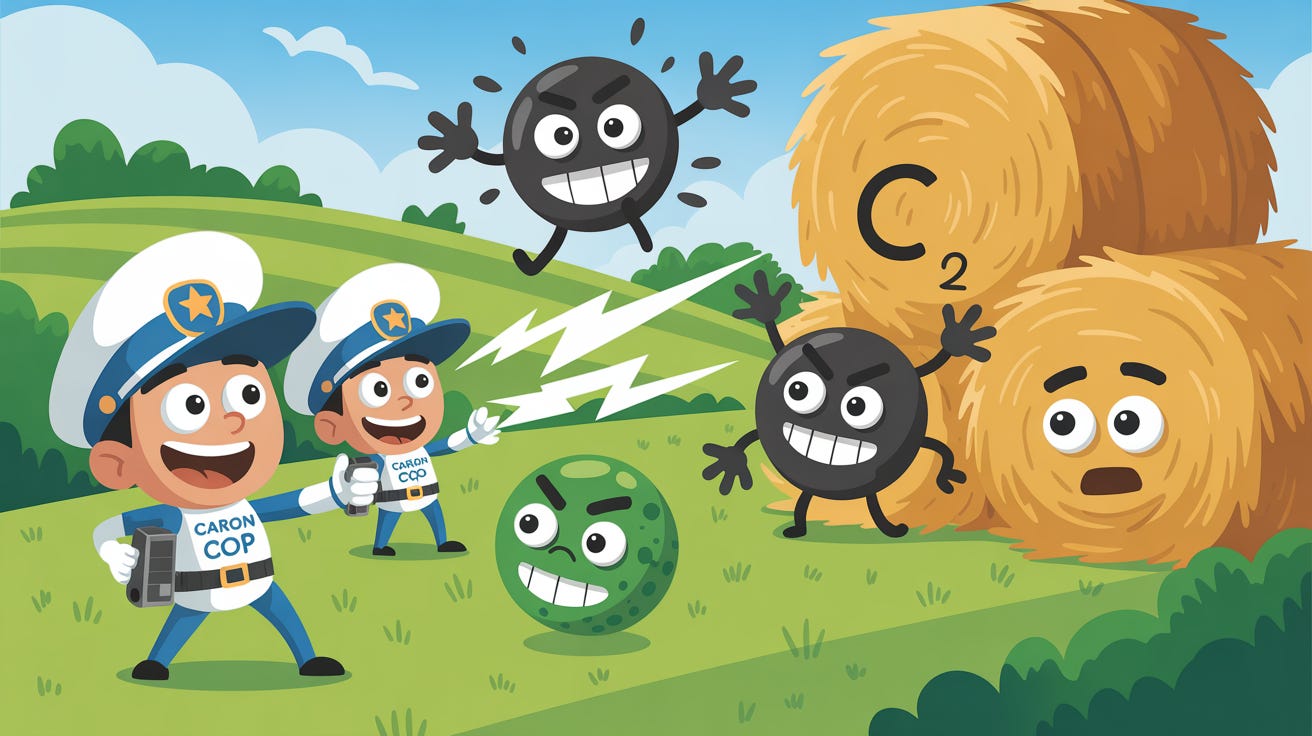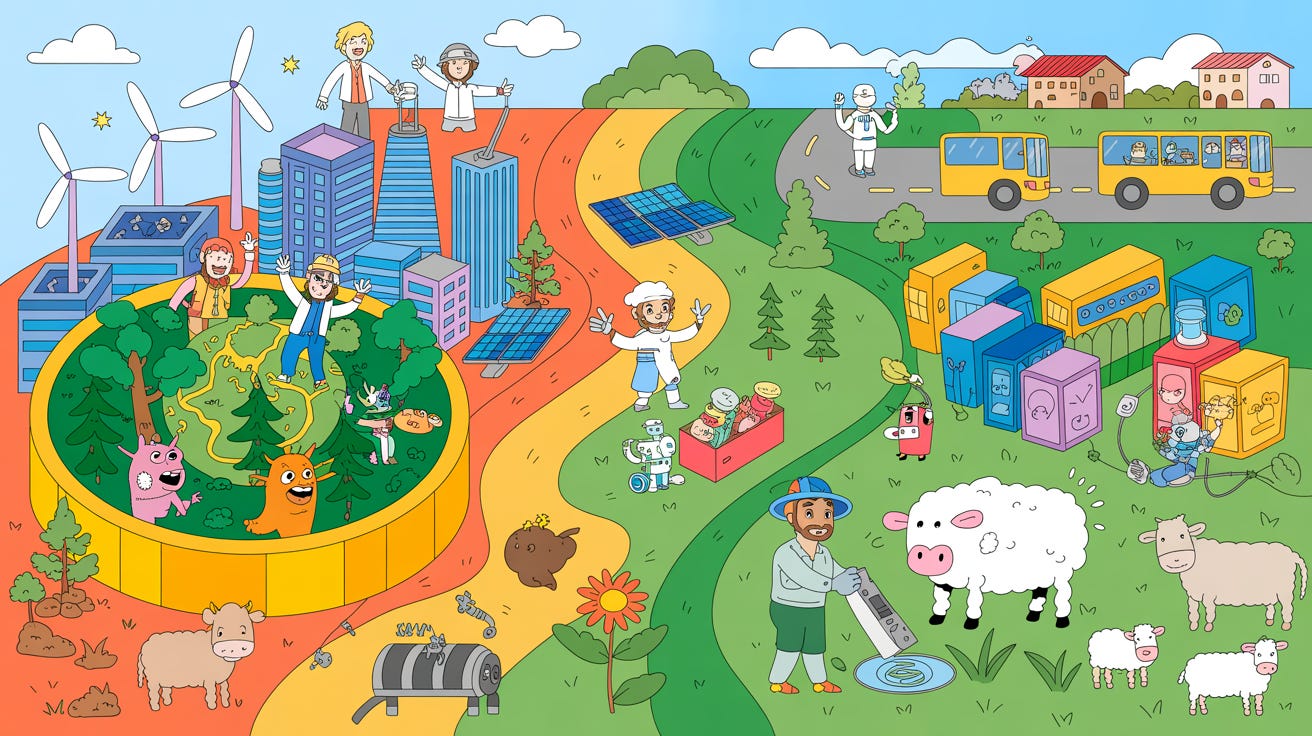The Roundup: Methane, Amazon Fund and the French AC Scandal (August 23rd, 2025)
This week: China is fine with foreign investments for green projects, Ambient Carbon wants to zap methane and France is upset about air-conditioning
Happy Saturday!
I must admit, this was a big of a slower week than previous ones. I blame summer vacations.
On that note, I am going on vacation next weekend and will not post the regular roundup.
Hope you enjoy this edition!
In this edition:
Bigger Things:
China says foreign capital is not that bad for green projects
It turns out that extreme heat is not good for productivity
The Amazon is getting a lot more money
Smaller Things:
Weather traders hedge against wind droughts
Air-conditioning is France’s latest scandal
Hail is making your insurance more expensive
Cooler Things:
Worried about methane? Zap it!
The Bigger Things
China says foreign capital is not that bad for green projects 🔋:
What Happened? China launched a pilot in 16 provinces that lets domestic companies borrow more from overseas, in yuan or foreign currency, if the cash finances low-carbon projects. Regulators promised lighter risk-weighting and faster approvals, continuing a multiyear push to lure global capital into renewables, hydrogen and grid upgrades.
Why Care?🤷♂️ Because you just might be able to do business in China after all. China is known for its strict restrictions on foreign investments, making it difficult for those who want to operate in the country. But, with ambitious emissions targets, China needs (and wants) foreign capital to help fund the transition. Still, with mounting US pressures on China, this new regulatory relaxation might not be enough.
It turns out that extreme heat is not good for productivity🥵:
What Happened? A joint report by the World Health and Meteorological Organizations (WHO/WMO) warns that labor productivity falls 2-3% for every °C above 20 °C. With record 40 °C days now common, the agencies say 2.4 billion workers face rising heat stress that already causes 22.9 million on-the-job injuries each year and forces employers to pay double shifts to make up lost output.
Why Care?🤷♂️ Because when AI comes for your cushy office job, you’ll be the first to suffer from climate change-induced heat exhaustion. Ok, seriously, climate change has real and visible impacts on the labor market, and as it gets worse, economies around the globe will suffer additional productivity losses, and will likely change how labor markets might look like.
The Amazon is about to get a lot more money💸🌴:
What Happened? Brazil, Colombia and the other members of the Amazon Cooperation Treaty Organization agreed to sign the “Tropical Forest Forever Fund” at November’s COP 30. The facility aims to raise $125 billion by issuing high-yield bonds and investing the returns in 70-plus rainforest countries, rewarding them for cutting deforestation and protecting carbon-soaking ecosystems.
Why Care? 🤷♂️ Because, trust me, you don’t want to live in a world where the Amazon is not doing its job. Thanks to deforestation, frequent and growing forest fires and climate change, the Amazon, our planet’s lungs, is slowly becoming a carbon emitter. In recent years, however, attempts are being made to protect the rainforest from these threats, and this fund is one significant effort. If successful, it can be used elsewhere to prevent degradation of important climate stabilizers, like the Boreal forests, mountain ecosystems and others.
The Smaller Things
Weather traders hedge against wind droughts 🌬️:
What Happened? Calm weather cut wind power by 30% early in the year, causing energy companies and investors to buy weather insurance much earlier than they used to. Interest in insurance for winter is up about 20%, as Europe’s largest power market prepares for more unpredictable wind patterns that can quickly affect how much money is made from electricity.
Why Care?🤷♂️ Because this will only get worse. Put simply, we’re headed for a bumpy road in the coming decades with respect to the weather. While most of us equate climate change with more storms and rains, it really means uncertain and volatile weather. Wind droughts are definitely a part of the deal. As renewables take a bigger share of Europe’s energy mix, we need mechanisms to deal with the increased uncertainties that are expected to come.
Air-conditioning is France’s latest scandal🪟:
What Happened? France’s sweltering June heatwave sparked a political storm after far-right leader Marine Le Pen blasted the “absurd” lack of air-conditioners in hospitals and the 1,800 schools that had to close, and promised nationwide air-conditioning if elected. Green Party chief Marine Tondelier fired back that blanket cooling is energy-wasteful and that real resilience lies in insulating France’s leaky buildings first. Polls show the nation split, putting the air-conditioner at the center of a growing culture war, even as heatwaves become more common.
Why Care? 🤷♂️ Because if you’re visiting France, you’re not likely to have an air-conditioner available during the next heatwave. For the French, the politization of air-conditioners does not bode well. France, like many other European countries, will face a tough choice in the future: Install air-conditioners at scale and risk increased emissions, or… not, at the cost of excess heat-related deaths. Politicizing air-conditioners will not help France or the French. It should be noted that the EU is trying to find a third way, with its CoolLife project.
Looks like US mines can use recycling to satisfy their renewable needs ⚙️:
What Happened? New research suggests that aggressive recycling, product redesign and lifetime extensions could meet 80-90% of lithium, copper and other critical mineral demand through 2050. The model challenges assumptions that an inevitable “mine, baby, mine” wave must follow the clean-tech boom, though some virgin extraction would still be needed for fast-growing sectors.
Why Care? 🤷♂️ Because you may not need to learn Chinese after all. China’s overwhelming control over critical mineral mining and processing requires a US response, and that response might not need new mines at all. If the US is able to turn its recycling efforts to 11, it just might be able to satisfy its advanced industries’ needs with its existing infrastructure, which may prevent, and maybe even reverse, the apparently inevitable trend of ceding geopolitical power to China.
The Cooler Things
Got a problem with Methane? Zap it! ⚡
People often say that pretending a problem isn’t there won’t make it go away. But what if zapping it will?
In recent years, more attention has been drawn to Methane’s contributions to climate change. While CO2 is more widely known as the ultimate bad guy, Methane’s notoriety is on the rise, and with good reason: it is more potent, and removing it can greatly help slow climate change. But the question is: What to do with it?
Danish startup Ambient Carbon wants to convince us that the answer is: zap it. Ambient Carbon has managed to reduce up to 90% of Methane in a recent experiment in a dairy farm, turning it to CO2 and water. Ambient Carbon uses UV light to activate chlorine that produce reactive radicals that interact with Methane, instantly breaking it down.
To be fair, there’s no electricity in this process. I guess the term zapping was used due to the instant nature of the breakdown 🤷♂️
Ambient Carbon could help farms and methane-belching cattle reduce their methane emissions, paving the way to meaningfully deal with the culprit.
AI-ify the News
As always, here’s an AI-generated picture that should somehow summarize the news. Whether it’s successful or not is up to you to decide.
That’s it for this edition of News Reconfigured.
Stay tuned for my new hot take on Tuesday, and see you soon next week!
…oh, and don’t forget to subscribe - it would mean a lot! 🔽








